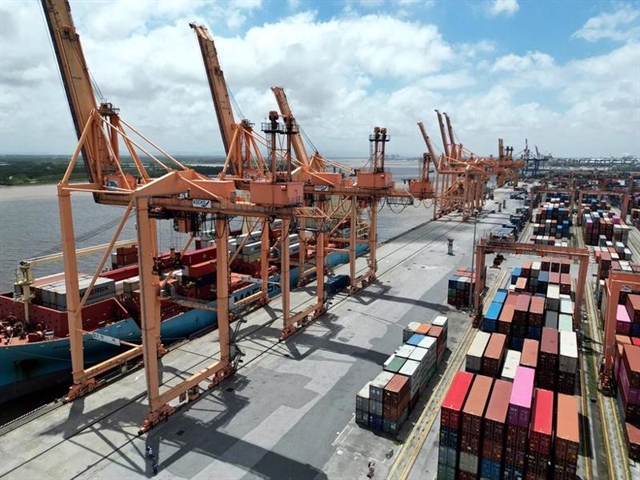As the threat of a global trade war looms, insiders held that Việt Nam needs to take proactive steps to develop tailored responses that will insulate its production, business, and export activities from the effects of market volatility.

HÀ NỘI — As the threat of a global trade war looms, insiders held that Việt Nam needs to take proactive steps to develop tailored responses that will insulate its production, business, and export activities from the effects of market volatility.
In 2024, the total value of Việt Nam’s foreign trade approximated US$800 billion, with exports hitting $405 billion. Shipments to the US alone accounted for almost $119 billion, marking a 23.3 per cent increase compared to the same period in 2023.
However, recent tax policies introduced by the US after President Donald Trump’s re-election have begun to affect markets globally, with Việt Nam being no exception. If a trade war erupts, Vietnamese exports to the US may face significant challenges. Price volatility and rising costs will likely reduce export volumes and put businesses under pressure.
In light of the trade war risk, it is crucial for Việt Nam to monitor market developments both regionally and globally so as to make timely analysis and forecasts to enable effective and rapid responses.
In early February, global trade tensions escalated when the US announced a 25 per cent additional tariff on imports from Mexico and Canada, as well as a 10 per cent additional tariff on Chinese goods starting February 4. However, shortly after, President Trump declared a one-month suspension of tariffs on Mexico and Canada.
The 10 per cent tariff on Chinese imports, however, remains in force, prompting Beijing to retaliate with a 15 per cent tariff on coal and liquefied natural gas (LNG) products, along with a 10 per cent tariff on crude oil, agricultural machinery, and large engine vehicles imported from the US.
At a Government meeting on February 5, Prime Minister Phạm Minh Chính noted complex changes of the global political and economic environment, as well as major trading partners like the US and China may directly impact Việt Nam’s exports and business operations. He urged cabinet members to forecast and analyse emerging issues such as the possibility of a global trade war, which may disrupt supply chains and narrow Việt Nam’s export markets.
Ministries and local authorities were instructed to propose solutions and response strategies to ensure Việt Nam can navigate these challenges while seising opportunities for growth.
Trần Thanh Hải, Deputy Director of the Ministry of Industry and Trade (MoIT)’s Foreign Trade Agency, confirmed that the industry and trade sector aims for a 12 per cent increase in exports this year compared to 2024. However, the global landscape in 2025 is expected to remain volatile, with unpredictable changes on the horizon.
Despite these challenges, the MoIT has prepared for several scenarios to maintain and boost exports, including creating contingency plans to address the impacts of new US tariff policies, he said.
It will continue to leverage existing free trade agreements (FTAs) while pursuing new deals to expand and diversify Việt Nam’s export markets, products, and supply chains. In addition, it plans to boost shipments to nearby and emerging markets via the official channel and step up brand building to promote sustainable export growth. Trade promotion efforts will be enhanced as part of the broader strategy to weather global uncertainties, said H.
The MoIT advised Vietnamese exporters to stay informed about market changes, take proactive steps to respond, and ensure transparency in product origin. Exporters should make full use of FTAs, tap into niche markets, and seize new opportunities to overcome challenges in an increasingly unpredictable global trade landscape.
Meanwhile, Deputy Minister of Planning and Investment Trần Quốc Phương acknowledged that global developments may present significant challenges to export activities this year, particularly due to the protectionist policy and tariffs imposed by the US.
He highlighted the PM’s emphasis on maximising benefits of the FTAs Việt Nam has signed and accelerating the negotiation of new agreements. He underscored that expanding markets and securing stable sale will be essential for maintaining growth.
Minister of Industry and Trade Nguyễn Hồng Diên reiterated the importance of continuing to capitalise on existing markets while exploring new ones, enabling businesses to diversify their customer base, products, and supply chains to bolster export growth.
Nguyễn Quốc Việt, Deputy Director of the Việt Nam Institute for Economic and Policy Research (VEPR), warned that the possibility of a global trade war may disrupt supply chains and weaken global production and consumption. This will directly hinder Việt Nam’s export growth and undermine its economic momentum.
He emphasised that Việt Nam must continue gearing up for potential shifts in the global economic landscape. On the diplomatic front, the country has successfully positioned itself as a friendly, open and trustworthy partner on the global stage. Việt Nam’s participation in multilateral agreements and institutions is essential to strengthen international ties.
The expert also stressed the need for stronger collaboration with key business partners, improved domestic business environment, and diversification of growth drivers. — VNS





